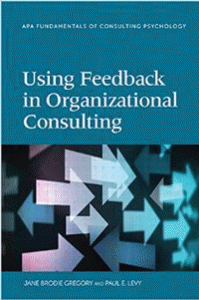“Using Feedback in Organizational Consulting”

“Using Feedback in Organizational Consulting”
By Jane Brodie Gregory and Paul E. Levy
American Psychological Association
Washington, D.C., 2015
Book on feedback has wide application
Reviewed by James K. Luiselli, Ed.D., ABPP, BCBA-D
This book is a publication of the American Psychological Association Fundamentals of Consulting Psychology Book Series, which is intended to provide consulting psychologists with concise, easily accessible, and evidence-based texts that highlight practice and research domains within particular areas. In this case, the topic of interest is using feedback for effective performance management in organizations. Specifically, authors Jane Brodie Gregory and Paul E. Levy opine that their book “provides evidence-based practices on how to give, receive and help others deliver feedback in the most effective way possible.”
Feedback operates by informing individuals about their behavior so they can perform optimally in an occupational setting. One fundamental principle of this book is that all organizational employees should be both the recipients and implementers of performance feedback. With this foundation, the authors concentrate on four critical elements of any feedback exchange: (a) the feedback provider’s actions, (b) the content of feedback, (c) the feedback recipient’s beliefs and perspectives, and (d) the context in which feedback is delivered.
Noting the relative brevity of the book (125 text pages), the authors begin by describing classic models of feedback within organizations. They then explain how the process of feedback operates, with reference to learning principles and factors that predict performance-enhancing effects. Leaning heavily on research findings, the authors carefully distill and synthesize many practice recommendations “to arm you with actionable and useful ideas for improving the way you approach feedback in your daily work as a consultant.”
This highly laudable book appeals on several levels. First, most every psychologist I know recognizes the value of giving and receiving feedback – this book will accentuate your knowledge about the topic. Furthermore, the book should be absolute reading for anyone unfamiliar with performance feedback implementation. Note, too, that “organizational consulting” refers to diverse settings such as for-profit industries, hospitals, behavioral health care agencies, and human services programs. In effect, the book has wide application, notwithstanding the unique challenges that different organizations present.
The book’s impact will also be felt if you have ever worked in or been associated with an organization that does not understand, value, or apply performance feedback. Employees in such settings report poor job satisfaction, have low morale, are confused about their work responsibilities, lack a sense of personal control and do not perform with sufficient motivation. With a strategic and continuously monitored performance feedback plan, it is possible to minimize these undesirable outcomes and build a satisfied workforce.
Another conclusion of the book, which I endorse unequivocally, is that exemplary performance feedback takes place in an organizational culture that is devoted to the individual growth and development of its employees, nurtures two-way communication, avoids unilateral decision making and emphasizes honest, fair, and unpretentious interactions at every opportunity.
So, as much as this book advises consultation practices, it needs to get in the hands of organizational leaders who have to be educated about giving, and even more apparent, receiving feedback.
Finally, whatever managerial role you serve as a psychologist, this book will strengthen your supervisory, consultative, and training skills. The authors are well attuned to virtually every factor that constitutes feedback, be it the characteristics of the feedback provider and recipient, communication style, when and how feedback is given, and the influence of power-hierarchy on feedback effectiveness. And as the book makes eminently clear, performance feedback works best when the people involved like, trust and respect each other, a definitive admonition if there ever was one.
James K. Luiselli, Ed.D., ABPP, BCBA-D, is Chief Clinical Officer, Clinical Solutions, Inc. and North East Educational and Developmental Support Center, Tewksbury, Mass..
Learn more about the book: Using Feedback in Organizational Consulting (Fundamentals of Consulting Psychology)
